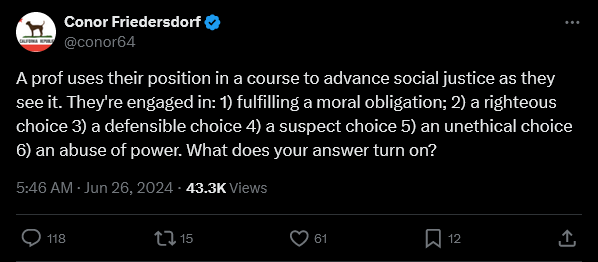E-Pluribus | July 2, 2024
First Amendment out of control? SPLC v its employees; an obscure lawsuit cuts the administrative state down to size
A round-up of the latest and best musings on the rise of illiberalism in the public discourse:
Tim Wu: The First Amendment Is Out of Control
If you think the First Amendment was designed to protect all speech, you are mistaken, says former White House staffer and Columbia law professor Tim Wu. Writing in the New York Times, Wu argues that the First Amendment “is spinning out of control” as liberal and conservative courts alike expand its protection to corporations and classify any movement of information as speech:
The First Amendment was a tool that helped the underdog.
But sometime in this century the judiciary lost the plot. Judges have transmuted a constitutional provision meant to protect unpopular opinion into an all-purpose tool of legislative nullification that now mostly protects corporate interests. Nearly any law that has to do with the movement of information can be attacked in the name of the First Amendment.
Monday’s Supreme Court decision in the two NetChoice cases greatly adds to the problem. The cases concern two state laws, one in Florida and one in Texas, that limit the ability of social media platforms to remove or moderate content. (Both laws were enacted in response to the perceived censorship of political conservatives.) While the Supreme Court remanded both cases to lower courts for further factual development, the court nonetheless went out of its way to state that the millions of algorithmic decisions made every day by social media platforms are protected by the First Amendment. It did so by blithely assuming that those algorithmic decisions are equivalent to the expressive decisions made by human editors at newspapers.
Jeryl Bier: The Southern Poverty Law Center: Media Sees Evil, Hears Evil, Reports No Evil
The SPLC just laid off a quarter of its staff while adding additional donations to its nearly billion-dollar reserves. You probably missed the press coverage of this classic employer-union standoff—because there was very little of it. Fortunately, our editor Jerry Bier has you covered with a full analysis of the dispute, including an explanation of the media’s almost total silence, in the latest Pluribus Original:
A nationally known organization with a highly-paid CEO and three-quarters of a billion dollars in net assets publicly feuds with its employees’ union over mass layoffs, all while continuing to rake in new dollars. Sounds like a story the media wouldn’t be able to resist. But in the case of the Southern Poverty Law Center, most did just that.
SPLC employees first voted to unionize in 2019. When management reached an agreement with the union in 2022, president and CEO Margaret Huang gushed, “This is a proud day for the SPLC — true to our work and true to our values, we are proud to be a unionized organization. SPLC has fought for, supported, and partnered with unions for decades. Union values are in our DNA.”
The honeymoon is over. Earlier in June, the union lashed out on Twitter (X): “Today, @splcenter - an organization with nearly a billion dollars in reserves, given an F rating by CharityWatch for “hoarding” donations - gutted its staff by a quarter.” Shielding a favored source from embarrassing publicity is a prime example of the bias of omission that plagues much of the traditional media. It is no wonder a growing awareness of this kind of selective reporting has the public seeking alternative sources of news.
Illya Shapiro: Long Live Judicial Review
Many legal scholars and reporters have lamented the Supreme Court’s decision to send the Chevron Deference through the paper shredder. ‘Judges now have final authority on science policy,’ the panicked commentariat warns. Manhattan Institute director of constitutional studies Illya Shapiro has a different take: the Court wisely restrained self-aggrandizing executive agencies that have increasingly inserted themselves into almost every facet of American life:
Whoever thought that an obscure case about fishing regulations would bring down a core part of modern administrative law, the rules that govern the executive-branch agencies that write the rules by which we live our lives? In Loper Bright Enterprises v. Raimondo, the Supreme Court has overturned the 1984 case Chevron U.S.A. v. Natural Resources Defense Council, which told judges to defer to “reasonable” agency interpretations of their operative statutes.
…
As I wrote for City Journal before Loper Bright was argued last fall, Chevron led to agency overreach, haphazard practical results, and the diminution of Congress. Though intended to empower Congress by limiting the role of courts, Chevron instead enabled agencies to aggrandize their own powers to the greatest extent plausible under their operative statutes, and often beyond. Courts, in turn, have gotten lazy in interpreting statutes. It’s become a vicious cycle of legislative buck-passing and judicial deference to executive overreach.
Around Twitter (X)
Cato Institute scholar Scott Lincicome was rather…unimpressed by Tim Wu’s New York Times essay:
Yale professor of social and natural science Nicholas Christakis with a refrain that will probably resonate with loyal Pluribus readers:
Finally, Conor Friedersdorf poses an intriguing question about social justice activism in the college classroom. The whole thread is worth a read, though Steve McGuire’s and Geoffrey Miller’s replies stood out to us.










